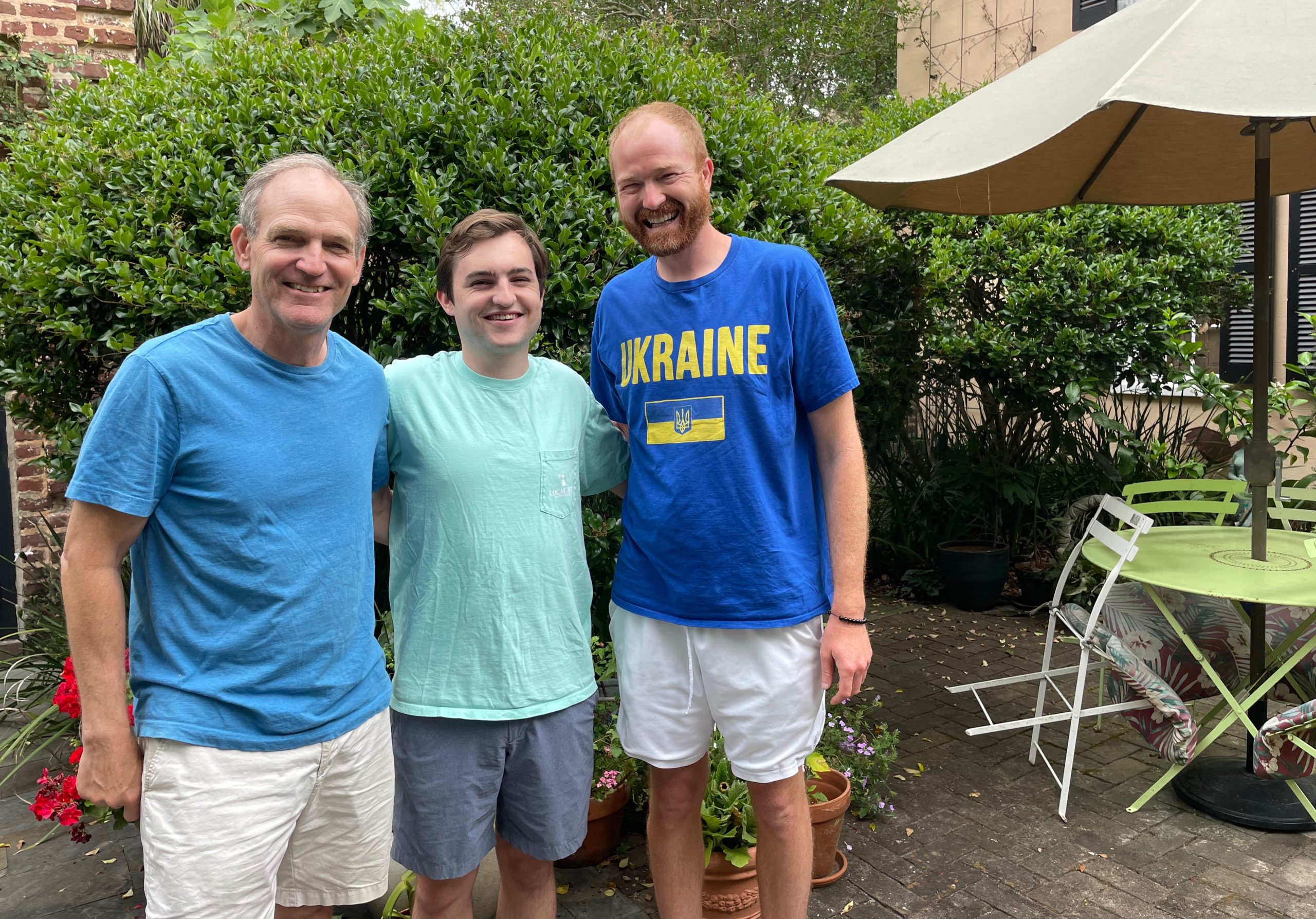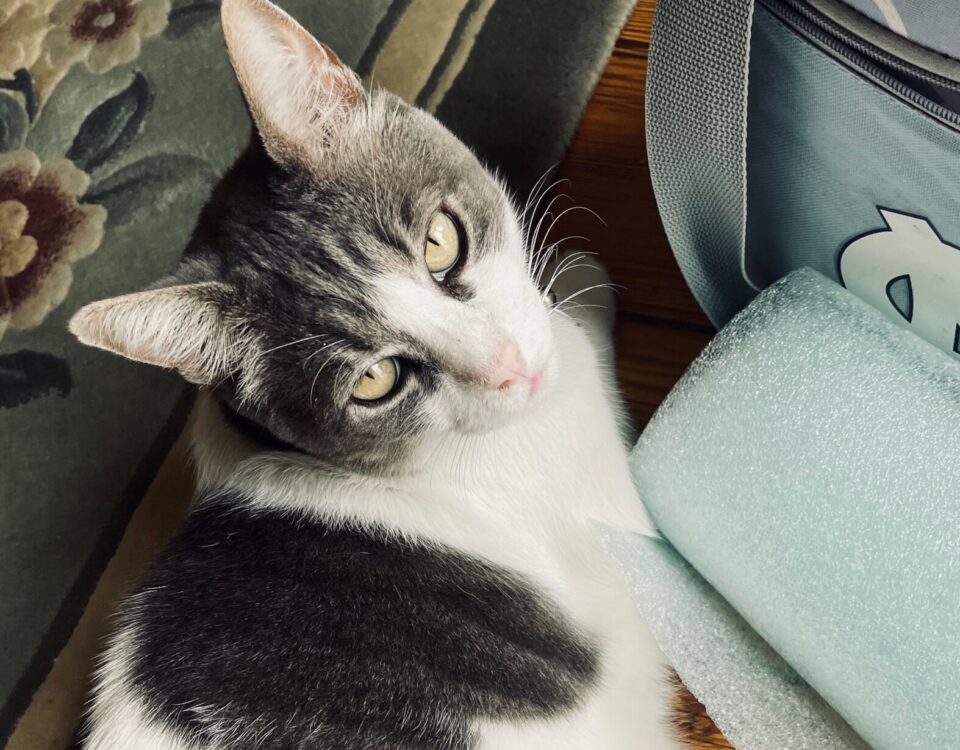How a tall, gregarious Ginger can change the world
About this time last spring, I was rooting out pesky weeds in my street-front garden when a passerby stopped to chat. Generally when I am working a chore, I don’t welcome interruptions. However, this lanky red-headed guy kept prattling on; he had a good, earnest laugh. I remember him saying how much he loved our house and how he had never seen anyone in the yard, and he thought it was such a shame, because he felt like the people who lived there should be outside enjoying that nice yard.
His open smile was delivered with a child-like friendliness. I put down my garden spade and turned my head to get a better look at Derek Snook, who was already inviting me to his 35th birthday party, to be held at The Blind Tiger, a local tavern. He was one of those people who seemed to believe that a stranger was only a friend whom he hadn’t yet met. Seriously! I knew better than that by the second grade.
Was this guy for real? When he started talking about CoLife, his start-up company, something clicked. That’s when I recognized him.
Not long before that, I had read an interesting feature in The Post & Courier about Derek and CoLife. This minister’s son from Mt. Pleasant was on fire to connect people in a communal way and to create more rental space in the overpriced Charleston housing market. His big brainstorm invites homeowners (hosts) to be matched by CoLife with a tenant (guests). In the CoLife model of cohabitation, the rent price does not eat up an obscene amount of the guest’s paycheck. Yet the host still benefits from extra income and from having a friendly soul around the house.
CoLife instantly appealed to me as being God inspired. Not only did it establish a win-win, symbiotic relationship between the host and the guest, CoLife also made use of existing structures, potentially saving countless woodland acres from being bulldozed and turned into apartments. Imagine if this idea caught on and spread around the world?
Little did I know then that Derek would eventually become part of our household; he has been renting our carriage house since August 2021. Not only is he a very nice person, he’s also a wonderful cat sitter and plant waterer. Our cat Cyrus speaks very highly of him.

Several months ago, CoLife received major funding from Platform, a big deal venture capital fund in California.
Click to read more about the VC funding.
Now Derek is working furiously to expand CoLife in the Charleston area. So, I thought it was a good time to let him tell you more about it. We’re especially enthusiastic because our son Baker, a recent graduate of UNC, has joined Derek’s team as the first employee. As you can imagine, the spiral of growth depends on getting more hosts. Usually hosts and guests pay fees to cover their background checks, but for a limited times, hosts do not pay these fees.
THERE ARE HEROES IN OUR MIDST
By Derek Snook (Founder and CEO of CoLife)
Over the weekend I spoke to someone who had just rented out her downtown carriage house for a whopping $5,000 a month. I knew the tenant who had lived there just a few months earlier, before this person bought and renovated the carriage house. The previous tenant had paid 150% less rent.
I was stunned by the rent inflation, though clearly the Charleston market can currently bear the increased costs. Apparently there are people willing to pay $60,000 a year in rent. If you quickly do the math, renters like that must make more than $100,000 a year before taxes just to pay for their housing. This makes finding good, affordable housing very difficult for most working people and students. And the problem is growing.
The next day I had cocktails and a charcuterie board while sitting on a blanket with a friend who lives a block from the College of Charleston. “Jessica” loves renting in a big, historic home that’s been split into condos. While eight people currently live in the condos, the home was recently sold to a neighbor who informed the tenants that they will have to move. The new owner plans to convert the property to an upscale single-family home. All eight of them, architects, nurses, and teachers—occupations we need to make this city work—are panicking.
“If I can’t find something for $1,500 a month soon I’m going to have to leave Charleston,” Jessica said. She is no stranger to insane housing. As an architect, Jessica moved to Charleston from Manhattan. And yet, she feels that housing in Charleston almost seems worse.
I told Jessica two things.
First, I’m in this with her, and I’m personally going to get involved to help her find housing. Miraculously, I remembered a close friend who rents apartments downtown in her price range and connected the two of them on the spot.
Then I quoted to her a verse from the Bible that I do not feel gets enough airtime. “Woe to you who buy house after house and land after land,” the prophet Isaiah says, “until everyone is evicted, and you live alone in the land.”
According to Isaiah, just because something is legal, like renting a carriage house for as much as one can charge, doesn’t mean it Is moral.
As the son of a minister, I was raised on the Bible. As I grew up and matured into my own philosophy of faith, I settled upon two dominant themes for the kingdom of heaven. First and foremost, it’s a communal event. It’s a banquet, a wedding, a feast, a huge party, and everyone is invited. But then, despite receiving the invitation, people come up with their own reasons not to come. They are too busy doing other things: they have business to attend to; they think that they are too good for the other people that are going to be there; or conversely, they think that they are not good enough.
Nothing divides people into castes more than housing.
Every sign that says, “homes from $500,000 and up” excludes those who don’t fit that socio-economic status, oftentimes people who are older, or whose incomes are low, or people who have a disability. If I’ve learned anything from my experiences with human connection—like living voluntarily homeless for a year or driving a jalopy from Mongolia to London—it’s that when we silo people away, we gain personal space but also lose the beauty of life.
The second most common way the kingdom of heaven is expressed is as a vocational journey. The kingdom of heaven is like a man who found a jewel in a field and, in his great joy, sold everything that he had in order to buy that field. This guy didn’t diversify. He didn’t hedge his bets. He found a vocational journey he loved and went all in.
Here, too, housing is one of the fastest things that pulls us away from that journey and from the kingdom of heaven. For too many of us, we abandon our vocational journey to pay for the worries of the world. Often times, first and foremost, that worry is our housing.
In the United States, people have expanded their personal borders and pushed their neighbors away over the last 50 years by doubling their average home size. Perhaps that’s part of why today’s housing prices are higher than ever.
But there are heroes in our midst.
Earlier in the day, before my conversation with Jessica, I met a homeowner on Daniel Island through CoLife, my startup that matches the massive demand for attainable housing to the massive supply of people with extra space in their homes. Consider this: 24 million homeowners nationwide live in a 3 bed, 2 bath house alone, and millions of other homeowners have garage apartments or other such auxiliary spaces that they could rent. In the case of the Daniel Island CoLife host, “Susan” rents her very nice extra living space to grad students, young professionals, and a retired couple, for a very reasonable $1,000 a month.
Susan uses CoLife because of the background and credit checks and the successful matching process. The extra income is really nice, but she’s quick to add the deeper, real reason.
“My husband and I remember when we were young and could hardly afford housing,” Susan said, “and so we know what it’s like.” Susan has a desire to make a difference and give back. “I feel greedy having this space and not offering it up. I’m an active church goer. I feel an obligation to open it up and help others. It’s a no-brainer to offer space we don’t use.”
As soon as Susan said this, I was reminded of a famous quote:
“The best thing a man can do for his culture when he is rich is to endeavor to carry out those schemes which he entertained when he was poor.”
Henry David Thoreau
I was also reminded of the famous activist Jane Jacobs who prevented an interstate from being built through the heart of Manhattan. In her famous book The Death and Life of Great American Cities, Jacobs suggests that to prevent cities from cannibalizing themselves, landlords should voluntarily charge less than they might be able to get for critical businesses and workers. It’s bad for both the rich and poor when restaurants or shops close, when trash cycles get missed, when teachers switch professions, because average people cannot afford to work and live.
Before World War II, half of Americans living in big cities rented rooms in boarding houses, a source of flexible, reasonably priced, relationship-oriented housing. This is still how the majority of humans around the world live today. In fact, three of the homes in my Charleston neighborhood near Colonial Lake used to be boarding houses, including the one where I currently rent my apartment. The boarding house model may not be glamorous, but people were meant to live in communities, not in silos.
We started making matches in 2019, as a pilot project in Charleston. Lives were transformed. I’ve watched homeowners get sober in part through the human connection offered by living with their CoLife guest. I’ve watched sweet little old ladies build friendships and have wine and movie nights with their guests. I’ve watched single moms live together and help care for each other’s children. I’ve watched 30-year-olds be able to return to school to pursue their dream to become a nurse because they had secure housing. Our homeowners are nearly always doing things to indicate that they believe that this world is about more than themselves. Linda, one of our hosts in her late 60s, just left for Poland to help with the Ukraine crisis.
Yes, housing matters for teachers, nurses, hospitality and retail and city employees, and grad students. From the homeowner side of the match, retired therapists in South Windermere say their property taxes have skyrocketed and they need the extra income to avoid having to move. Yes, I believe that most of our biggest social problems are first and foremost those of human trust and connection.
In The Great Divorce, C.S. Lewis describes Hell as a place where people cling to their pile of possessions with little regard for the need of others. In my opinion, it’s very hard to get people to care about a problem that isn’t their own. But when someone does care enough to do something about it, whether it’s saving a child from a fire or offering someone a place to live, we might call that person a Good Samaritan. If you’re renting a room in your home, or a second property below market rates, thank you, because you are a hero, and we need heroes now, more than ever.








3 Comments
Wonderful initiative and much-needed! I hope he comes to California someday.
B: I think he will! Thanks for the encouragement.
Such a wonderful and positive story! Thank you Pringle and Derek.